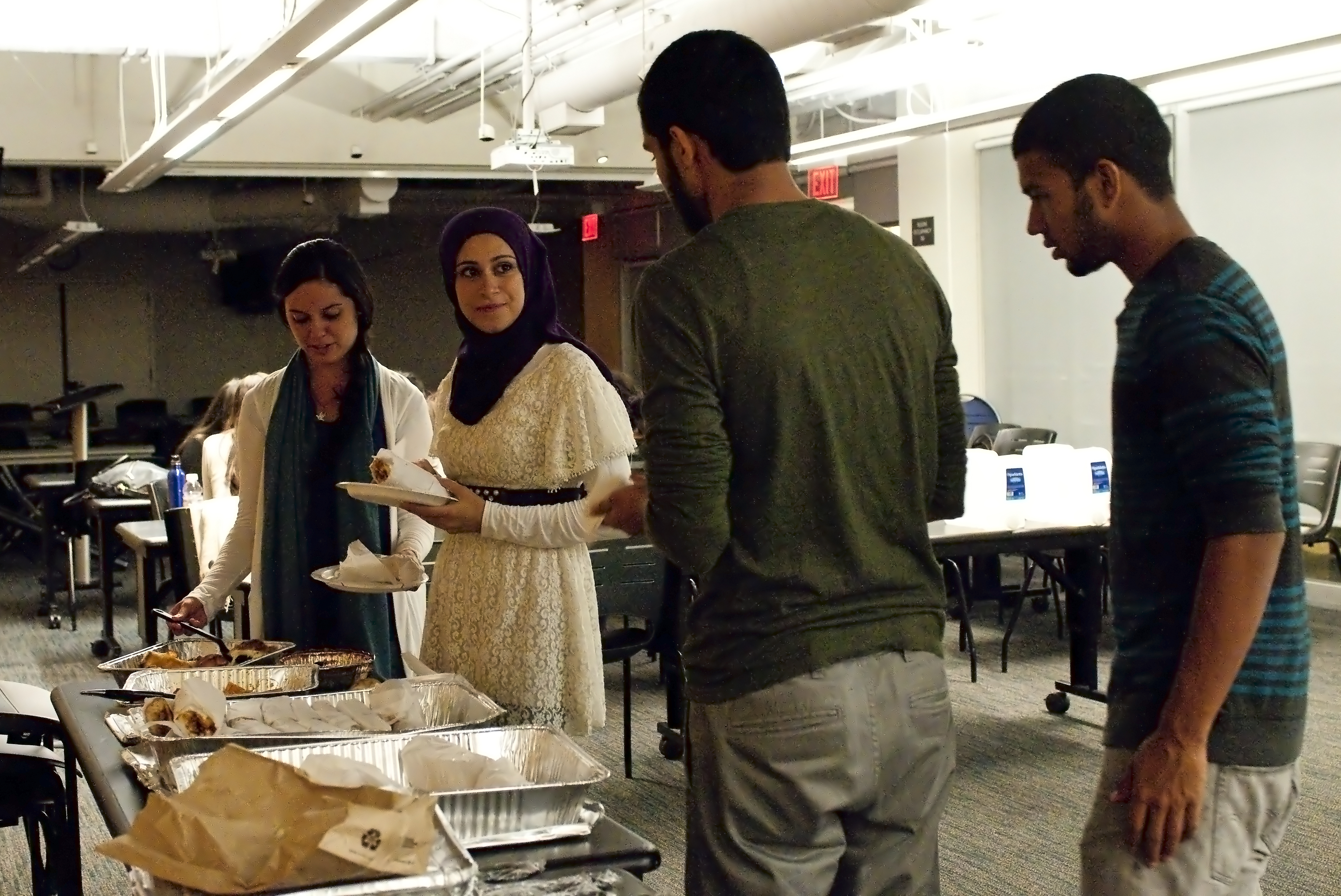The smell of hot wings and curry wafted through the air of the Student Activities Center as the forks and knives of about 50 Muslim Students Association members clattered to break another day of fasting.
The holy month of Ramadan is in full swing, and for Muslim students this means balancing their religious lives with their college lives.
During Ramadan, which started on July 20, Muslims are required to abstain from drinking or eating from sunrise to sunset.
The Muslim calendar is based on the lunar cycle, which means Ramadan falls on a slightly different time each year. For the last two years, Ramadan has occurred in the summer which means Muslim students taking summer classes or internships have to observe fasts away from their family.
A typical day during Ramadan involves waking up before dawn to pray and partake in suhoor ““ a meal before the day’s fast begins, said Yasmeen El-Farra, a Muslim and second-year international development studies student.
Afterwards, El-Farra proceeds through her day like normal ““ except without eating or drinking. She said fasting can be particularly difficult when she is rushing from her apartment to her North Campus classes.
“You feel it in your throat, you feel it but you know you can do it,” El-Farra said.
She added that on normal days, she tends to have a hard time staying hungry for too long, but that she finds the stamina to stay away from food during Ramadan.
“I feel that God helps us because before (Ramadan) I’ll be shaking after three hours (without eating) ““ my hands will be shaking, my head will be hurting, I’ll be freaking out,” she said.
She added that it can often be a struggle to balance Ramadan, classes, her research and work, and sometimes has to pray quickly in her apartment or at a library.
“Most of the time I break fast at work,” El-Farra said. “I work at a call center, so I’ll put the line on hold, I’ll eat really quickly and then I’ll continue.”
At dusk, Muslims usually break their fast with a date fruit and water at a meal called iftar. Since the start of Ramadan, the Muslim Students Association has hosted nightly iftar meetings at the Student Activities Center. The meal has averaged about 30 participants a night, said Asmar Ghani, a third-year microbiology, immunology and molecular genetics student who is also MSA’s programming director.
El-Farra said she likes going to the meetings and being with people who share the same culture, where it is normal to remind each other to pray before eating and to say Arabic phrases.
“It’s comforting to know you’re not on your own, that you have people backing you up,” she said.
Cem Yesilyurt, a Muslim and third-year civil engineering student, realized he had a problem when he learned he would be attending UCLA during Ramadan.
No dining halls are open before dawn.
“When Ramadan entered the summer sessions, we entered a difficult time as Muslim students,” Yesilyurt said.
Knowing students could pack a sack lunch during breakfast, Yesilyurt contacted UCLA Dining Services to see if he could get a sack meal for when he started fasting in the morning.
Dining officials agreed to arrange an option for students to receive a sack breakfast during dinner for an extra meal swipe, which counts toward the next breakfast period.
Yesilyurt said he usually breaks his fast at a dining hall in the evenings. Afterward, he picks up a sack meal to eat the next morning.
The pre-prepared sack meal consists of basic breakfast foods, such as bagels, cereal and fruit, Yesilyurt said.
Special diet requests, such as this one for Ramadan, are often made throughout the year, said Daryl Ansel, director of food and beverage for UCLA Housing and Hospitality Dining Services, in a statement. These requests are accommodated at the discretion of a dining hall’s head chef or general manager.
But for many Muslims, like El-Farra and Yesilyurt, Ramadan is more than just fasting.
Muslims are expected to be virtuous throughout the year ““ but they are expected to be even more virtuous during the month of Ramadan, El-Farra said.
During Ramadan, Muslims should abstain from improper behavior or bad habits, like watching too much television or cursing, and instead devote time to prayer and studying the Quran, the holy book in Islam, El-Farra said.
“I like that (Ramadan) tests me, but I miss my family,” she said. “At home you have people to wake you up and remind you to do this, to do that. Here I wake up and I have to tell myself, “˜Do not watch TV, do not watch Netflix.'”
After breaking their fast some members of the Muslim Students Association carpool to a local mosque ““ typically the King Fahad mosque on Washington Boulevard ““ where they continue their prayers and recite verses from the Quran. The goal is to read the entire text before the end of Ramadan, El-Farra said.
Last year during Ramadan, the Muslim Students Association also reached out to Islamic Relief, an international relief and developmental organization, to organize a fundraiser for the citizens of Somalia suffering from a famine, Ghani said. The students raised about $30,000, he said. This year, the organization’s members are encouraged to bring their own utensils to iftar dinners in an effort to support sustainable living, Ghani said.
“Ramadan is a very special part of the year,” El-Farra said. “(Ramadan is) where you are closest to God, you are closest to religion, where you are the most kind.”
